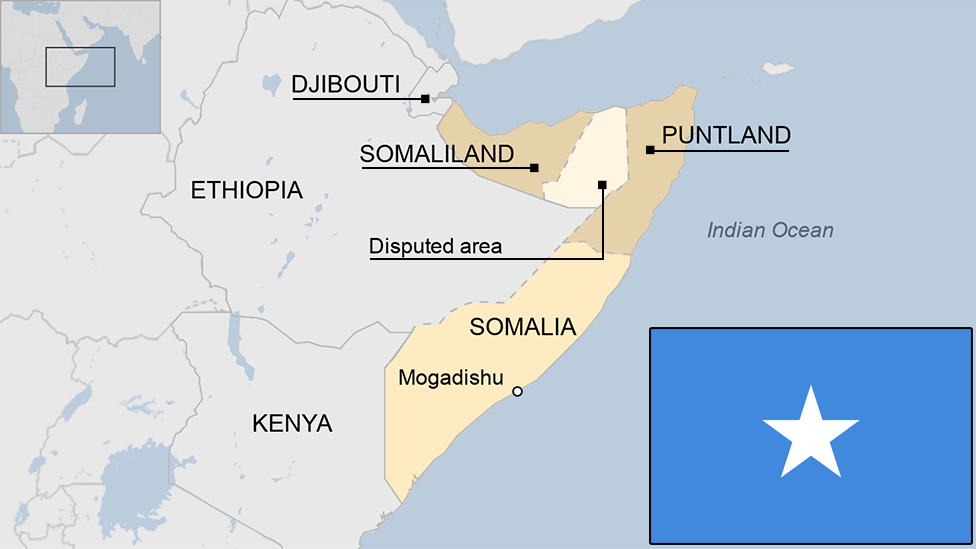Inside Somalia's hidden world of sex work
- Published
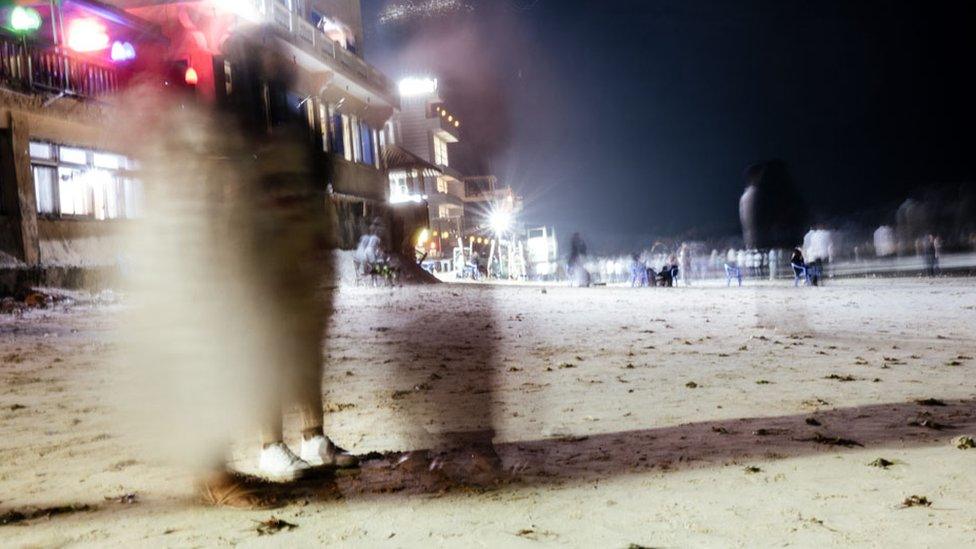
Mogadishu's Lido Beach is a thriving part of the capital's life, but nearby there is a hidden side
Two women in Somalia's capital, Mogadishu, have been talking to the BBC about how they got drawn into the underground world of sex work in a city living under the threat of violence following years of civil war. We have changed their names to protect their identities.
Mogadishu's vibrant and bustling Lido Beach offers a glimpse of what the city could become, as it tries to leave the conflict behind.
The seaside resorts, upmarket restaurants, hotels and fresh food are huge attractions.
But lingering nearby is an alternative scene - of partying, drugs and sex-fuelled violence.
The women caught up in this hidden side of the city are young, destitute and often vulnerable in this mainly Muslim nation.
Fardousa, 22, who has been a sex worker for three years, sits in a dark room shaded by red curtains in a bullet-ridden apartment building in Mogadishu's Wardhigley district.
Above the screeching noise of the stove, the slim young woman with a soft voice describes what happened to her.
Fardousa explains that she left home at 19, a rare occurrence in Somali society where young women generally do not leave the family before they are married. However, abuse at home or irreconcilable differences with other family members can push some away and this appears to be a growing phenomenon.
"At first I didn't see it as running away but I couldn't bear to live with my stepmother any more," Fardousa says.
"She became my father's second wife after my mother passed away when I was young. She was very abusive over the years and despite this, my father would always take her side."
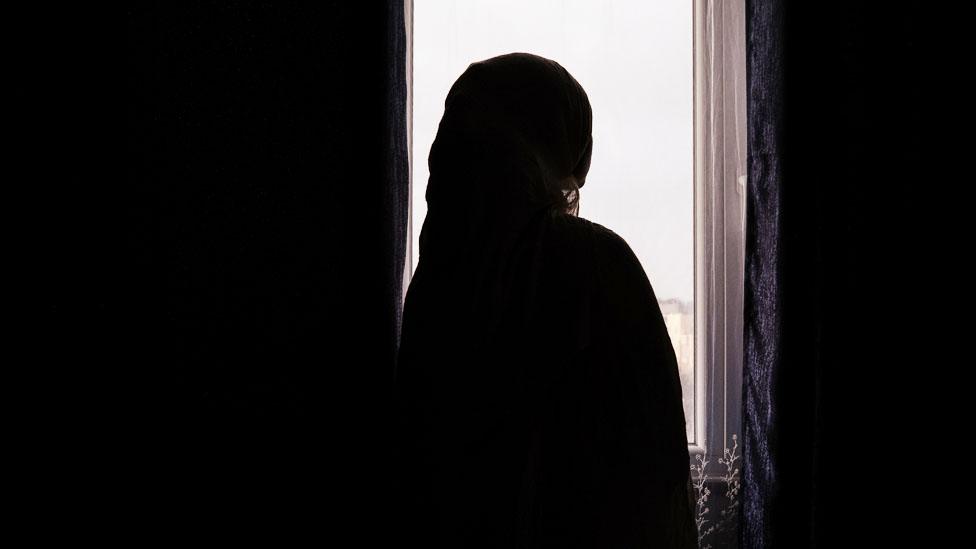
Mogadishu's sex workers live in the shadows and their voices are rarely heard (model used in the picture)
After leaving home, Fardousa drifted from place to place making new friends, who she thought would look out for her interests, along the way: "I thought they cared about me. Looking back now, I know they weren't real friends."
She eventually became addicted to opioids such as morphine, tramadol and pethidine, and joined the underground party scene at Lido Beach, where she was introduced to sex work.
Fardousa soon found herself enmeshed in Mogadishu's murky underworld where she went from hotels to strangers' homes to secluded locations.
But now she knows enough potential clients that she can rely on people contacting her by phone.
"I wait for my phone to ring and then go out with the men to have sex. Other times, my female friends call me when they have men ready."
'I needed money for my addiction'
She deals with a variety of clients from all walks of life.
"These men at first were male friends of my female friends, then it changed to having sex with different men that I didn't know. I was vulnerable and needed the money for my addiction, just like many other young women in this city," says Fardousa.
Because of its nature, there is no official data on the extent of sex work but the testimony from Fardousa and others offers a glimpse into the dangerous environment that many of these young women find themselves in.
Hodan has been a sex worker for two and a half years. Like Fardousa, the 23-year-old ran away from home and found herself immersed in Mogadishu's underground lifestyle consisting of fellow young runaways who have no financial support.
She speaks above the sound of children playing football outside in a steady and calm voice.
"I spend most nights in hotels. The same goes for many of these young women. You meet all kinds of men there but things can take a turn for the worse when you actually go off with some of these men," Hodan says.
As sex work is illegal in Somalia, many of these young women find themselves in precarious situations with no recourse to the authorities.
The BBC requested comment from officials in the police and the ministry of women and human rights development about this and other issues raised in the article, but did not get a response.
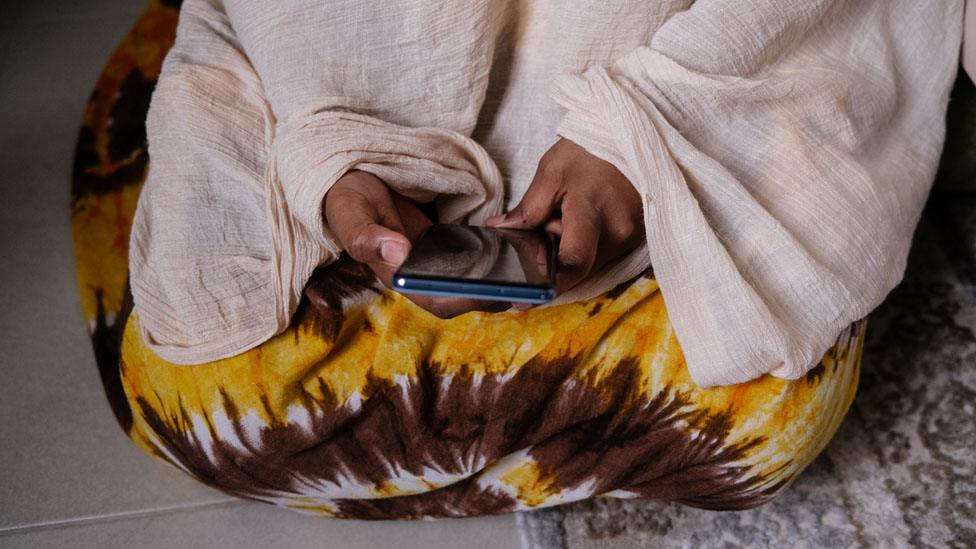
Some sex workers, like Fardousa, now use their phones to be in touch with clients rather than risk making contact in a dangerous place (model used in the picture)
"Many times the girls come back abused with marks on their bodies, while other young sex workers are taken advantage of by people they think they can trust," according to Hodan.
For Fardousa, this led to violence.
"Early on, I used to go with men to places of their choosing to have sex but one night I was beaten and got bruises on my face and was left bleeding. It all started because we didn't agree on the price," she says.
"Ever since then, I don't go to secluded places with any men, regardless of how much they're offering. It's just too dangerous. I prefer hotels knowing you won't be harmed and if you are, then your cries for help will be heard.
"Many other women involved in sex work aren't so lucky. Sex workers that go with these men to their homes and secluded places are abused and even raped, sometimes by more then one man."
She also says that the assaults are sometimes filmed and the women are then blackmailed.
"They are shamed into submission."
'Hard to face loved ones'
Hodan says this filming can happen to sex workers after being drugged, with perpetrators coercing them to divide their profits.
"If they refuse, then they're beaten and physically abused by the men with the video being used as a tool against them. In some instances, they're even known to share the video around to torment the young women even more. It's a form of digital blackmail."
A recent report by the British TV network Channel 4 documented these forms of blackmail occurring within the female Somali population at large, beyond the margins of sex work.
"It's happened to so many young women I know. Most are too ashamed to admit it but we all know what goes around. We've been in this lifestyle long enough," Hodan says.
A UN report found that there was a big jump in sexual violence from 2019 to 2020, saying that abuse is often exacerbated in conflict zones. It also noted that "weak legislation allows perpetrators to walk free, and survivors receive little or no support".
Women who engage in sex work are among the most vulnerable in Somali society, as they are shunned because of their taboo lifestyle, essentially making them outcasts.
"In Somalia, women like us have no support system in place and there's nobody you can turn to. The societal pressure makes everything worse, which is why so many of these vulnerable women are reluctant to get help, especially if they face problems with addiction," Fardousa adds.
There are several women's organisations in Somalia but when contacted by the BBC they were unwilling to comment because of the sensitivity of the subject.
Hodan and Fardousa emphasise that many women would not enter into such dangerous work if the mechanisms and organisations were in place to support them, often leading them to being trapped in a violent and exploitative lifestyle.
"So many young girls are struggling with addiction which leaves them more vulnerable. A lot of them don't even have a place to sleep at night," says Fardousa.
"They resort to sleeping on the streets around the Lido Beach area and other parts of the city, while others go off with men for a place to sleep. They then become exploited for sexual gain even more."
Fardousa looks over her shoulder and sitting behind her is a young woman holding a toddler. She is a former sex worker, Amina, who stopped after she became pregnant.
"Amina always tells me to leave this life behind [and go back home], but it's not that easy. It's hard to face your loved ones. I haven't seen my family in three years."
Related topics
- Published27 December 2022
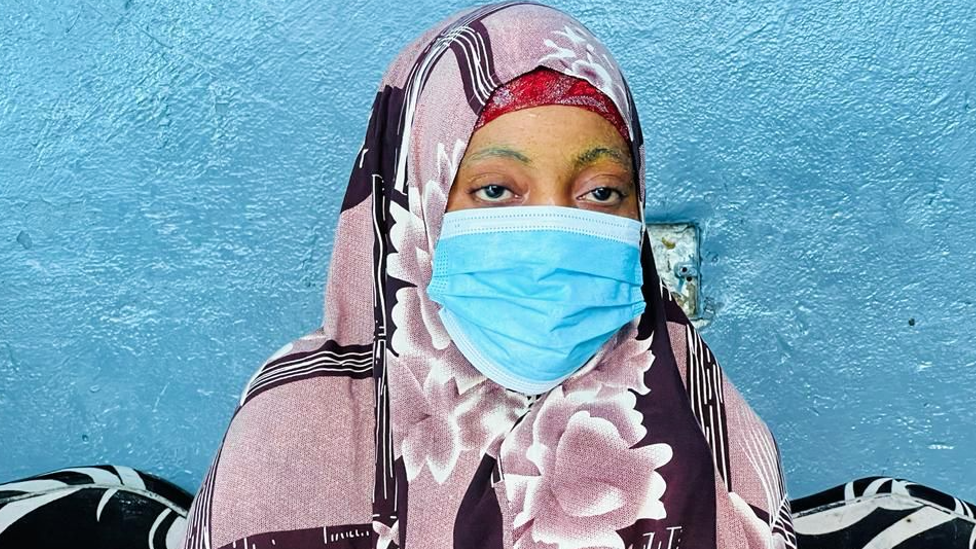
- Published2 January 2024
